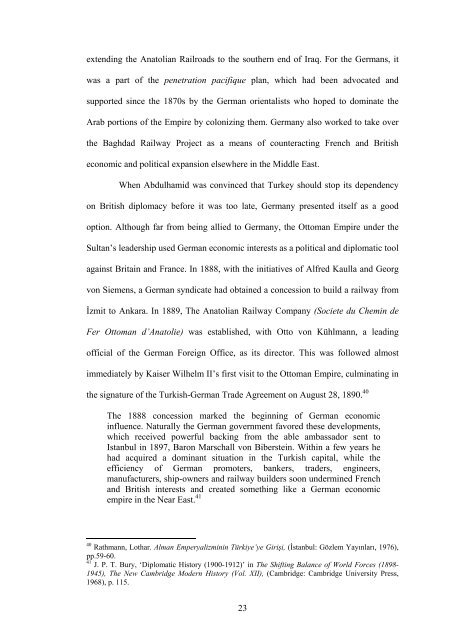the beginnings of ottoman-german partnership - Bilkent University
the beginnings of ottoman-german partnership - Bilkent University
the beginnings of ottoman-german partnership - Bilkent University
You also want an ePaper? Increase the reach of your titles
YUMPU automatically turns print PDFs into web optimized ePapers that Google loves.
extending <strong>the</strong> Anatolian Railroads to <strong>the</strong> sou<strong>the</strong>rn end <strong>of</strong> Iraq. For <strong>the</strong> Germans, it<br />
was a part <strong>of</strong> <strong>the</strong> penetration pacifique plan, which had been advocated and<br />
supported since <strong>the</strong> 1870s by <strong>the</strong> German orientalists who hoped to dominate <strong>the</strong><br />
Arab portions <strong>of</strong> <strong>the</strong> Empire by colonizing <strong>the</strong>m. Germany also worked to take over<br />
<strong>the</strong> Baghdad Railway Project as a means <strong>of</strong> counteracting French and British<br />
economic and political expansion elsewhere in <strong>the</strong> Middle East.<br />
When Abdulhamid was convinced that Turkey should stop its dependency<br />
on British diplomacy before it was too late, Germany presented itself as a good<br />
option. Although far from being allied to Germany, <strong>the</strong> Ottoman Empire under <strong>the</strong><br />
Sultan’s leadership used German economic interests as a political and diplomatic tool<br />
against Britain and France. In 1888, with <strong>the</strong> initiatives <strong>of</strong> Alfred Kaulla and Georg<br />
von Siemens, a German syndicate had obtained a concession to build a railway from<br />
İzmit to Ankara. In 1889, The Anatolian Railway Company (Societe du Chemin de<br />
Fer Ottoman d’Anatolie) was established, with Otto von Kühlmann, a leading<br />
<strong>of</strong>ficial <strong>of</strong> <strong>the</strong> German Foreign Office, as its director. This was followed almost<br />
immediately by Kaiser Wilhelm II’s first visit to <strong>the</strong> Ottoman Empire, culminating in<br />
<strong>the</strong> signature <strong>of</strong> <strong>the</strong> Turkish-German Trade Agreement on August 28, 1890. 40<br />
The 1888 concession marked <strong>the</strong> beginning <strong>of</strong> German economic<br />
influence. Naturally <strong>the</strong> German government favored <strong>the</strong>se developments,<br />
which received powerful backing from <strong>the</strong> able ambassador sent to<br />
Istanbul in 1897, Baron Marschall von Biberstein. Within a few years he<br />
had acquired a dominant situation in <strong>the</strong> Turkish capital, while <strong>the</strong><br />
efficiency <strong>of</strong> German promoters, bankers, traders, engineers,<br />
manufacturers, ship-owners and railway builders soon undermined French<br />
and British interests and created something like a German economic<br />
empire in <strong>the</strong> Near East. 41<br />
40<br />
Rathmann, Lothar. Alman Emperyalizminin Türkiye’ye Girişi, (İstanbul: Gözlem Yayınları, 1976),<br />
pp.59-60.<br />
41<br />
J. P. T. Bury, ‘Diplomatic History (1900-1912)’ in The Shifting Balance <strong>of</strong> World Forces (1898-<br />
1945), The New Cambridge Modern History (Vol. XII), (Cambridge: Cambridge <strong>University</strong> Press,<br />
1968), p. 115.<br />
23
















